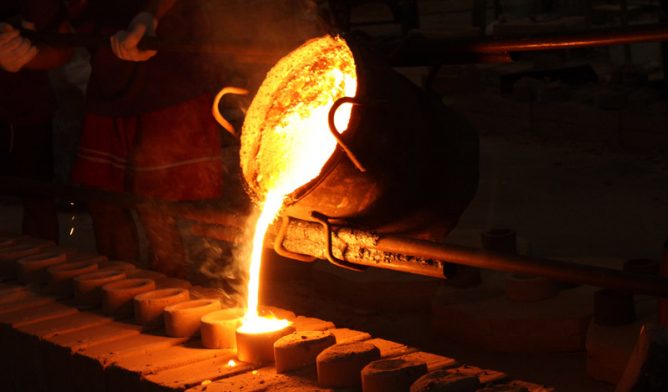Defunct Wisconsin Foundry Fined in Asbestos Exposure Case
Asbestos Exposure & BansWritten by Matt Mauney • Edited By Walter Pacheco
Asbestos.com is the nation’s most trusted mesothelioma resource
The Mesothelioma Center at Asbestos.com has provided patients and their loved ones the most updated and reliable information on mesothelioma and asbestos exposure since 2006.
Our team of Patient Advocates includes a medical doctor, a registered nurse, health services administrators, veterans, VA-accredited Claims Agents, an oncology patient navigator and hospice care expert. Their combined expertise means we help any mesothelioma patient or loved one through every step of their cancer journey.
More than 30 contributors, including mesothelioma doctors, survivors, health care professionals and other experts, have peer-reviewed our website and written unique research-driven articles to ensure you get the highest-quality medical and health information.
About The Mesothelioma Center at Asbestos.com
- Assisting mesothelioma patients and their loved ones since 2006.
- Helps more than 50% of mesothelioma patients diagnosed annually in the U.S.
- A+ rating from the Better Business Bureau.
- 5-star reviewed mesothelioma and support organization.
Testimonials
My family has only the highest compliment for the assistance and support that we received from The Mesothelioma Center. This is a staff of compassionate and knowledgeable individuals who respect what your family is experiencing and who go the extra mile to make an unfortunate diagnosis less stressful. Information and assistance were provided by The Mesothelioma Center at no cost to our family.LashawnMesothelioma patient’s daughter
How to Cite Asbestos.com’s Article
APA
Mauney, M. (2023, March 7). Defunct Wisconsin Foundry Fined in Asbestos Exposure Case. Asbestos.com. Retrieved April 16, 2024, from https://www.asbestos.com/news/2018/01/19/wisconsin-foundry-exposed-workers-asbestos/
MLA
Mauney, Matt. "Defunct Wisconsin Foundry Fined in Asbestos Exposure Case." Asbestos.com, 7 Mar 2023, https://www.asbestos.com/news/2018/01/19/wisconsin-foundry-exposed-workers-asbestos/.
Chicago
Mauney, Matt. "Defunct Wisconsin Foundry Fined in Asbestos Exposure Case." Asbestos.com. Last modified March 7, 2023. https://www.asbestos.com/news/2018/01/19/wisconsin-foundry-exposed-workers-asbestos/.

A Wisconsin court ordered the corporate owner of a shuttered foundry to pay more than $500,000 in fines and medical expenses for exposing workers to toxic asbestos.
Grede Holdings LLC, which was indicted last March, pleaded guilty Jan. 11 in the U.S. District Court in Eastern Wisconsin to violating a provision of the Clean Air Act.
As part of a plea agreement with federal prosecutors, Grede acknowledged supervisors at its plant in Berlin, Wisconsin, negligently ordered numerous employees in January 2012 to remove asbestos-containing insulation material from the roof of an inactive industrial oven.
“The company failed to provide the workers with adequate personal protective equipment, or follow standard asbestos abatement procedures, placing the workers in imminent danger of serious bodily injury,” according to a U.S. Department of Justice news release.
The court ordered Grede to pay a maximum fine of $200,000 and agreed to provide 11 affected workers with more than $340,000 for “future medical monitoring for mesothelioma and similar lung conditions.”
“It is well known that asbestos exposure is hazardous to human health,” Brad Ostendorf, assistant special agent in charge of the Environmental Protection Agency’s (EPA) criminal enforcement program for Region 5, said in the release. “If materials containing asbestos aren’t handled safely — and legally — workers and the community can be placed at great risk. EPA and its partner agencies are committed to protecting both the environment and public health.”
Struggling Factory Closed in 2015
Grede closed the Berlin factory in 2015, cutting 157 jobs. The company cited tough economic times in the mining, construction and agriculture markets as reasons for the cost-cutting efforts.
Just three years earlier, the foundry was the subject of controversy after several workers filed complaints about work done on the industrial oven.
According to the 2017 indictment, supervisors at the plant misled inspectors with the Wisconsin Department of Natural Resources and the Occupational Safety and Health Administration (OSHA) by providing test results of samples taken from inside the oven.
The report said “no asbestos was present,” but a second sample taken from the outside of the oven — where workers had been using jackhammers and chisels to remove insulation — tested positive for chrysotile asbestos.
Exposure to dust containing microscopic asbestos fibers can lead to serious health conditions, including mesothelioma, later in life.
Safety officials with Grede reportedly tried to cover up the exposure, sending out a company email that read: “Berlin staff: KEEP THIS INFORMATION UNDER RAP (sic) until we can hammer out our final plans of dealing with this issue.”
In April 2015 — just two months before announcing the layoffs and closing the Berlin foundry — Grede agreed to a $98,000 settlement with OSHA for repeatedly exposing workers at its Bowntown, Wisconsin, factory to dangerous silica dust.
Grede filed for bankruptcy reorganization in 2009 and merged into Metaldyne Performance Group (MPG) in 2015. A year later, MPG was acquired by American Axle & Manufacturing in a $1.6-billion deal.
Federal Requirements in Place to Protect Workers
Asbestos was one of the first hazardous air pollutants regulated under the Clean Air Act (CAA).
Section 112 of the CAA establishes National Emission Standards for Hazardous Air Pollutants (NESHAP), which lists specific compounds known or suspected to cause cancer or other serious health conditions.
The EPA first added asbestos to NESHAP in 1973, and since then, the regulation has been amended several times.
Any owner or operator of a demolition or renovation project who knowingly fails or causes another employee to not comply with these standards is in violation of the regulations. Penalties can include five years in prison and a fine. A second conviction can double those penalties.
In the Berlin factory case, the indictment named three people: Peter Mark, corporate safety and environmental director; Christy McNamee, safety coordinator at the Grede foundry in Berlin; and Steven O’Connell, operations manager at the facility. Grede was also named as a defendant.
As part of the plea deal, Grede pleaded guilty to criminal negligence and agreed to pay the $340,000 to the 11 employees in addition to the $200,000 fine. The charges against the supervisors were dismissed as part of the agreement.







